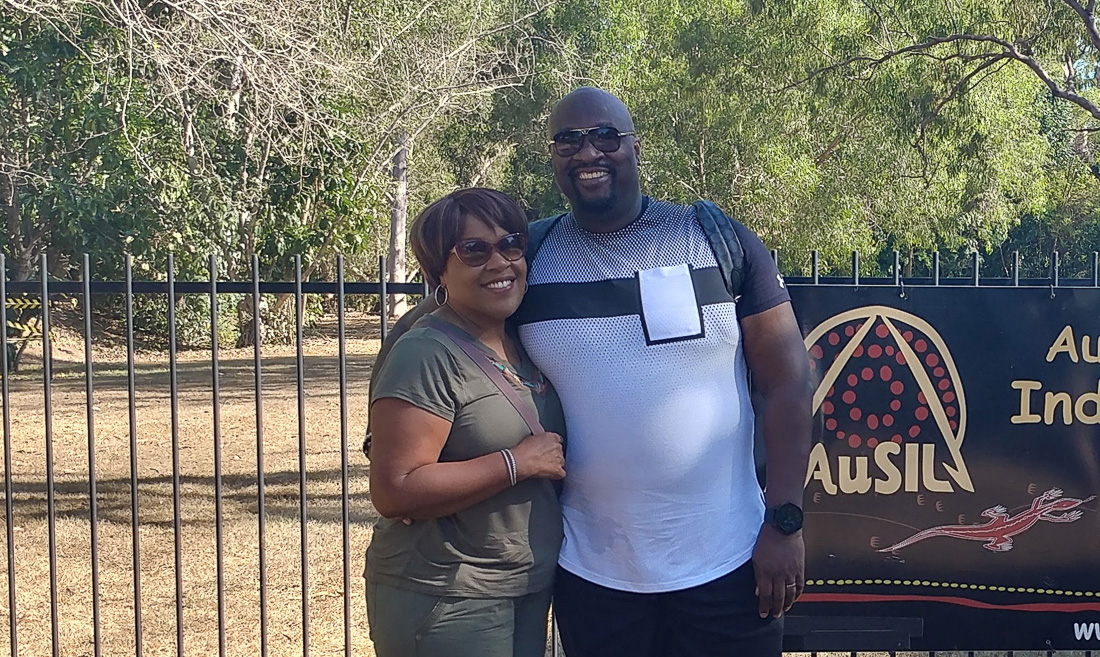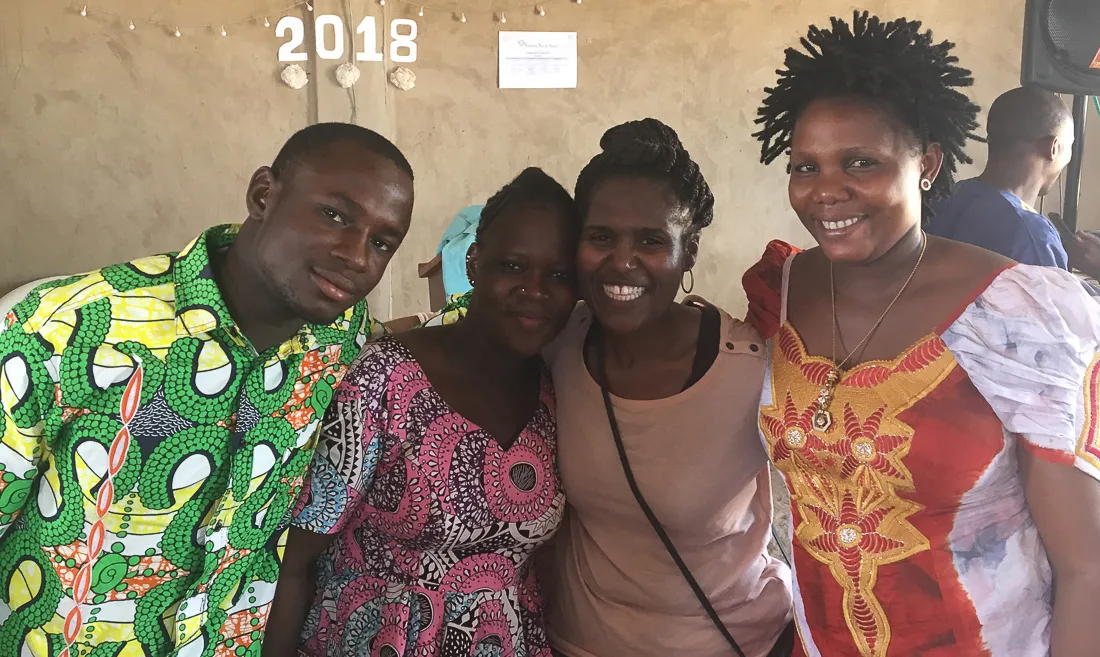Embracing the Imago Dei

When it comes to living boldly for the kingdom, Alton and Sandra Hardy have never backed down. In 2012 they moved to a poor community, Fairfield, Alabama, to plant Urban Hope Community Church (PCA), where Alton is pastor. There’s more than enough local need to keep them busy, but a vision trip with MTW changed their perspective forever.
“[In Fairfield] There aren’t enough police cars,” said Alton. “There’s robberies, shootings every night, burnt up houses. It looks like a third-world country. … But God’s put us on this course—going to the places nobody else would go. We’re going where it’s hard, where it’s grimy, where success is not going to come easy.”
Yet, though the needs of their neighborhood are great and the work at Urban Hope is far from finished, Alton continually and passionately preaches a challenge to global missions. Ministry at home and ministry abroad, in Alton’s eyes, are both the calling of the Church. As members of MTW’s RADD (Reformed and Diverse Delegates) initiative, the Hardys actively work to identify, raise up, and send the next generation of African-American missionaries. They’re passionate about sending a diverse missionary force, better reflecting the image of God and harnessing the unique gifts of diverse missionaries to bring the good news of grace to the ends of the earth.
But they didn’t always think this way.
Not on the Radar
Though both were raised in the church, neither Alton nor Sandra grew up hearing about missions or being encouraged to go.
“I would hear churches that were predominantly white talk about taking their kids to Costa Rica or different places that none of us were going,” Sandra said. “It was a big deal for us to go out of state, let alone outside the country. Missions wasn’t presented. It wasn’t on our radar. The opportunity wasn’t something for us to even consider.”
But the African-American church has a rich history of missionary activity. One of America’s very first missionaries was George Liele, an African-American emancipated slave who planted churches in Georgia before serving as a missionary to Jamaica. The PCA’s first African-American missionary, Joan Nabors, served with WPM (now MTW) in Kenya beginning in 1982. Very few have followed. It still remains that fewer than 1 percent of all American missionaries are black.

One of the biggest challenges, according to Alton, is having access to financial support. Many faithful African-American churches are just trying to survive and thrive in their own communities. Plus, in places like Fairfield, where the Hardys serve, clear and present needs in a church’s context often overshadow the global need for the gospel.
As a result, “The call to global missions has not been the conversation theologically from the pulpit or in our Bible studies [in the African-American church],” Alton said. “It has not come practically.”
A Changed Perspective
The turning point for the Hardys came in 2017, when Barbara D. Jones, who helps lead MTW’s efforts toward diversity, asked them to join MTW’s first all African-American team on a vision trip to the Aboriginal people of Australia. The Hardys were in their 50s, with decades of ministry experience under their belts. It was the first time either one had ever been asked to go on a mission trip.
At first, Alton was reluctant. After all, he was a busy church planter working among the urban poor. He didn’t have the time or the resources, and there was so much work to do right there in Alabama. They didn’t even have passports! Somebody else needed to go. But Barbara was persistent and, in the end, Alton and Sandra went to Australia.
The trip was life-changing.
“As soon as we got over there among the Aboriginals we realized that because of the pigmentation of our skin, because of our story as African Americans, we have a voice,” Alton said.
For many of Australia’s aboriginal people—as with countless other people groups across the globe—Christianity is inextricably bound up with colonialism and a history of Western oppression. When white missionaries show up today, they carry with them the crippling burden of that history. African-American missionaries are not only free from that baggage, but because of their own experience of oppression, they are relatable.
“I think we’ve got to put our strategic spiritual hats on here,” Alton said. “Indigenous people are often not able to trust whites because of their historical landscape, but because of my skin tone they were able to listen to me. … And I’m filled up with the Spirit of God. I mean, how dare I receive and not give that away?”
“[In 2 Corinthians 1:3–5,] Paul says that the afflictions that we have gone through happened so that we can comfort you as God has comforted us,” Alton added. “It’s reciprocal. …We’re taking our afflictions that we’ve been through as African Americans, not realizing God was so much farther ahead of us. … Now, in this ‘Esther’ moment … we can bring the gospel to a people group who may be writing God off because of injustice or affliction that they may be experiencing [or have experienced]. If God is sovereign, then our afflictions were not in vain.”
Extending the Call
By the time Alton and Sandra returned home, they were fired up to mobilize African Americans for missions, and they began to share their story with Urban Hope. Alton could feel the nations’ need for their Savior, he could taste the kingdom opportunity for African Americans on mission, and that gospel-centered call poured out from the pulpit every week.
When an opportunity came up for a short-term trip to West Africa with MTW, the Hardys encouraged a young woman from their congregation named Bridgett Tabb to go. Bridgett had never traveled outside the United States before, let alone to a different continent, but the Hardys’ excitement was contagious and the Spirit was already at work.
“The Great Commission was so heavy on my heart,” Bridgett said. “The first word is ‘Go.’ ‘Go and make disciples of all nations.’”

When Bridgett recalls her trip, she describes the vibrant colors of the African clothing, the searing heat of the equatorial sun, the beauty and harmony of creation, and the games she played with the little girls from the local communities. But most of all, she describes the call—that inexplicable, magnetic urge to stay, to pray, to serve in a land far from her home, to share the love of her Redeemer. She felt a stronger sort of gravity, a weight—but it felt right. It felt good.
“I don’t want to speak too fast,” she said, “but this feels like home.”
Now, she is preparing to return to West Africa next summer for a two-month internship—one bold step closer to long-term missionary service.
Better Reflecting the Imago Dei
“I’m so thankful for what the Lord is doing in the PCA community in particular right now,” said Bridgett. “People of color have been invited to the table and we want to take it a step further, not only being invited, but being welcomed.
As for Alton and Sandra, they continue advocating for RADD. “Our black brothers and sisters need to hear the call,” said Alton. ‘We need more people like Bridgett to pull up roots, go as a sojourner, and take that good news of the gospel to the world. … I pray and hope that in 25 years we would have people from every tongue and tribe and socioeconomic background on our mission fields, all working together for the kingdom of God. I want that to become normal, not just for the sake of crossing some racial diversity threshold … but diversity that is glued together by nothing but the sheer power of the gospel of electing grace.”
Interested in serving in global missions? Visit mtw.org/serve to search opportunities or email [email protected].
Watch the video about the RADD vision trip to Australia.